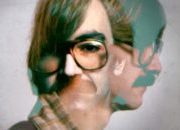
In this documentary that tells the story of the leading Argentinian LGBT activist Carlos Jáuregui, someone comments at one point ‘it’s important for our community to know where we have come from’ to which we would add, it is equally vital that we know who propelled us along the way too. Every LGBT community has a hero, often unsung and unknown to people outside of their reach, and this movie tells the story of one in particular who was the outspoken driving force for equality in Buenos Aires.
When Carlos Jáuregui finished his University degree in the late 1970’s he then went on to graduate school in Paris, followed by a couple of years in N.Y. which opened his eyes to how other countries had progressed on gay rights so much more than the Argentina that he returned too in 1982. That was however about to very slowly changed and after the Military Dictatorship fell and was replaced by an openly elected President, Carlos founded the country’s very first LGBT organization Argentina Homosexual Community (CHA) and became its first leader.
What he wanted for the fledging community was visibility and so he and his lover at the time became the first openly gay couple to be featured in a major magazine spread which was extremely controversial at the time. This also cost him his job as a University Professor, but renewed his ambition to raise the stakes even higher.
By this time his brother Roberto who was also gay had moved to Buenos Aires and as he loved performing wanted just fame and glory and not activism like his brother. However when they both were diagnosed with HIV, Roberto went public with the news ….. again a first for the community … and became a AIDS activist. Oddly enough Carlos kept his own diagnosis private, initially to protect Pablo his lover, who not only had the virus but was beginning to decline, but he still never revealed his status even after Pablo died.
Like so many other gay partners, the moment that Pablo died after Carlos had nursed him for ages, his late partner’s family turned up at the apartment and literally threw Carlos and his belongings out on to the street.
In 1992 Carlos led Argentina’s very first Gay Pride March, which although it was sparsely attended and most of the marchers wore face masks for fear of being recognized and losing their jobs, it was deemed a major success. In 1994 when the Catholic Cardinal made an outrageous public statement saying amongst other things that the LGBT community should be banished to their own country, it was Carlos who instigated legal proceedings against him.
However what seems to be Carlos’s biggest legacy is the fact that he insisted that to survive and prosper the LGBT community should really totally unite. The movement he claimed had four ‘legs’ : gays, lesbians, transexuals and transvestites , and if any one of the ‘legs’ were missing the ‘table’ would fall down. It set him aside as one of few gay male leaders anywhere that insisted that we should all be totally inclusive.
When the country’s National Constitution was changed in 1994, it gave Buenos Aires the right to write its own constitution. So two years later Carlos drafted what would be known as Article 11 of the Statute of the Autonomous City of Buenos Aires that proposed that you co no longer legally discriminate against people on the grounds of their sexual orientation or gender identity. However as soon as he submitted it Carlos started getting very ill and the clock started ticking for both the passing of the Law and his own life.
His very last public appearance was in that year’s Gay Pride March, but by now there were newer and younger voices prepared to take over his mantle.
After he died all of his colleagues from the political group GAY DC sat in the public gallery of City Hall as the Law was debated. Each of them had a photo of Carlos pinned to their chest, and Article 11 passed unanimously paving the way for more important laws in the future that would cover issues such as civil unions.
There was one final march where Carlos was still the figurehead when his coffin was paraded through the streets because people wanted to say goodby to him publicly and with dignity exactly like he had taught them to be about their own lives.
Whether his story will really resound with audiences outside of Argentina is a moot point, but as a global LGBT community it is important that we document our history of all the courageous men and women who devoted their own lives to improving the quality of ours that would follow. Technically writer/director Lucas Santa Ana (Bromance) had to rely heavily on some patchy archival footage and a collection of personal photographs of varying qualities, but despite these drawbacks Carlos’s story shines through so bright and was so very worthwhile knowing.

